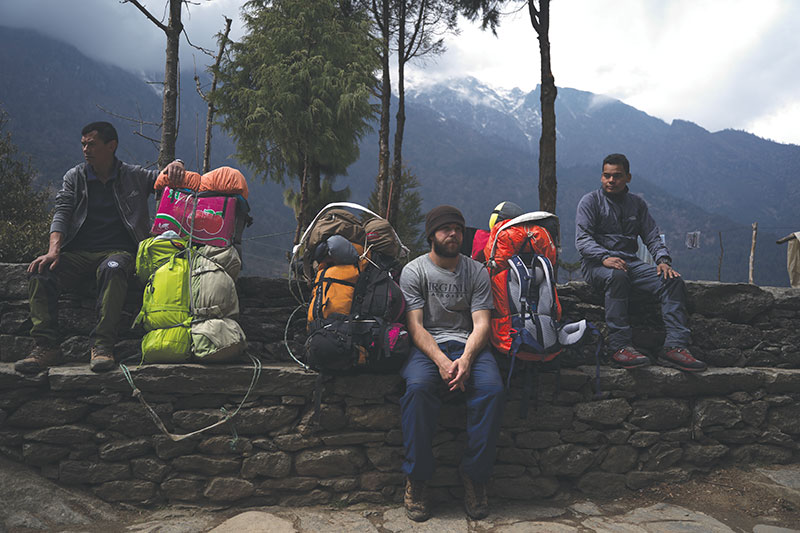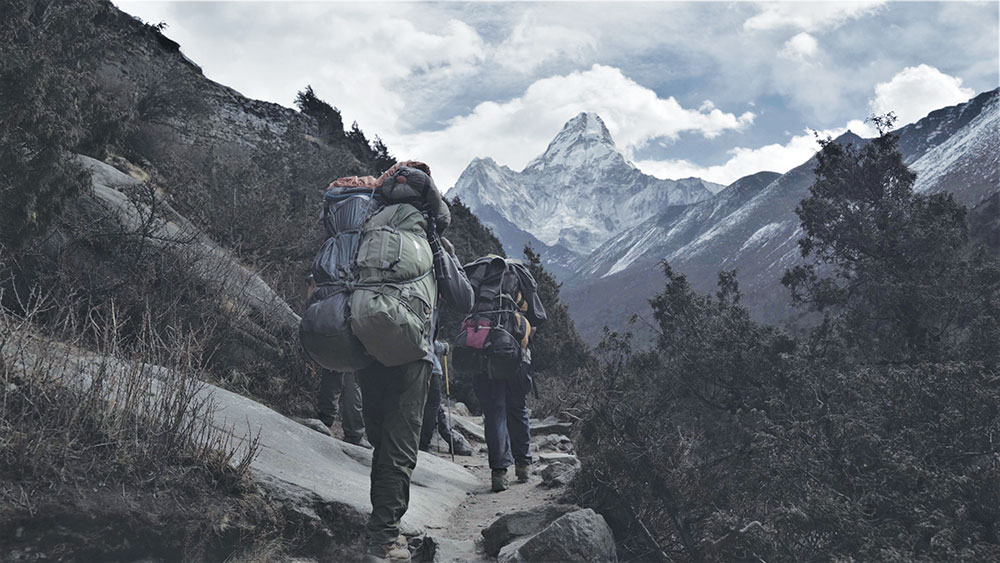Atlanta’s Nate Menninger made a film about working as a foreign porter on an expedition to Mount Everest—and discovered staggering injustices.
In late 2018, former University of Virginia lacrosse standout Nate Menninger got an idea that would change his life forever. By then he’d spent four years traveling the world seeking extreme adventures and learning about other cultures.
“I was interested in things that were dangerous and heavy on the adrenaline,” says Menninger, now 26 and based in Atlanta. “But there had to be some kind of historical tie, some sense of cultural uniqueness and authenticity around the experience.”
He spent two months living in Pamplona, Spain, training with, then running alongside, local veterans at 2016’s Running of the Bulls. Next came investigating Belize’s scuba-diving scene—namely, the Lighthouse Reef and its famous Great Blue Hole, a 400-plus-foot-deep marine sinkhole some 43 miles offshore. That was followed by a six-month South American solo backpacking trip to shred in Chilean and Argentinian backcountry ski areas. Time in Nepal brought vow-of-silence Vipassana Meditation, mountaineering at 20,305-foot Imja Tse, and guide work for U.S. adventure-tourism company, Putney Student Travel.
Menninger’s aforementioned epiphany centered around what to do next. “It felt absurd to have spent that much time in Nepal and not climbed Mount Everest,” he says. “I got fixated on the notion of climbing the world’s tallest mountain.”
But there was a catch: Trips cost $25,000-$50,000 U.S. dollars per person. Menninger didn’t have the money. The solution?
“I thought maybe I could get a job as a porter,” he says. Hauling expeditioners’ gear would let him climb Everest for essentially the cost of a plane ticket. And the gig promised intimate access to the elusive world of Himalayan guides and porters.
Menninger’s Putney contacts helped him get a job with a Nepali outfitter. Contracting for a March 2019 expedition made him one of the country’s first foreign porters, and then came the idea for a documentary.
“I started thinking, ‘If I’m gonna keep doing these adventures, I need to find a way to share them with others and give them a life beyond my own experience,’” says Menninger. A film would offer viewers an unprecedented window into the lives of porters, celebrate their physical prowess, and help Menninger establish himself as a media personality.
All that happened and more. Menninger’s film, “The Porter,” was released earlier this year. It reveals a world of segregation, exploitation, and disturbingly low wages. Yet, the seriousness of its focus was accidental.
“I was trying to make a movie using personal experience to highlight one of the world’s hardest and most physically demanding professions,” says Menninger. But the human injustices he observed were blindsiding and devastating.
“I’m not gonna lie, it made me weep,” says Menninger. “That’s when I realized: That’s going to be the true subject of my movie.”
The film follows Menninger from the small, 6,300-plus-foot-high Himalayan city of Jiri to Mount Everest’s 17,600-foot basecamp and back. He chose the route because, although more circuitous than others, it was used by Edmund Hillary and Tenzing Norgay when they made the first Everest summit in 1953.

The roughly 230-mile out-and-back took Menninger 23 days to complete. For the first week, he carried around 60 pounds of camera gear and supplies on the way to meet expeditioners in the mountain village of Lukla. After that, he bumped weights to 90 pounds, working up to a staggering 220 pounds on the final day.
“Private porters often carry that much and more,” says Menninger. While government regulations cap loads for outfitter employees at 55 pounds, “they almost always carry more. And my goal was to get the true experience, so I followed suit.”
The work proved unfathomably hard. Physical demands were exacerbated by extreme elevation and unanticipated psychological strains like money problems, no bathing, poor nutrition, segregation from clients, and harsh sleeping conditions.
“I’d played Division I sports and done my share of dirtbaggy backpacking stuff; I came into this thinking I’d take it in stride,” says Menninger. But that wasn’t the case. “You’re sleeping on floors; skipping meals and eating stuff like salted rice balls; being treated, at best, like you’re invisible, at worst, like an indentured servant. All of which takes a huge toll.”
Menninger plodded along in a disheveled fog. His belly growled with hunger. As he added more weight, his body rebelled. “I spent the last few days in an exhausted daze,” he says. “It took every ounce of willpower I had to force myself to keep up and keep going.”
The problems, Menninger realized, mostly stemmed from low wages. Porters made just $15 a day—and had to pay for their own food and lodging. While clients stayed in village hostels, porters slept in alleys or begged floorspace. They didn’t bathe. They carried no change of clothes (to make room for expeditioners’ gear). Relying on expeditions for income—tourism is the region’s primary industry—they pinched pennies to bring more home to their families.
“They’re basically hoping to break even on daily wages and get a decent tip at the end,” says Menninger. But while tipping is compulsory with reputable outfitters, it isn’t regulated. “The climbers are with the guides: They don’t see how porters live and they don’t know their wages.”
Menninger received a $100 tip upon reaching basecamp. After expenses—including an unpaid return trip—it was essentially his take-home pay.
“The injustice of it didn’t really hit me until I got back to Jiri,” says Menninger. The Nepali government charges about $11,000 per person in fees for permissions to summit Everest (891 achieved the feat in 2019 alone). That same year, outfitters were governmentally mandated to charge at least $35,000 to coordinate trips. Still, porters—on whose backs the industry is literally built—barely make a living wage.
“Here I was, gorging myself on food and getting ready to spend two weeks exploring the country before flying back to my posh U.S. existence,” says Menninger. Meanwhile, fellow porters would catch a night or two of rest, then set out again. “And that will go on throughout the climbing season and beyond.”
The realization gave direction to the film and led Menninger to begin pushing for better wages. He hopes to use “The Porter” as a catalyst for reform.
“These practices are unfair, exploitative, and have to change,” he says. While Menninger emphasizes the issue’s complexity, “To me, reform starts with visitors demanding their porters are getting paid fairly for the grueling work they’re doing, and being treated with the respect and dignity they deserve.”
Cover Photo: Jiban Tamang and Nate Menninger work their way past Ama Dablan on their 5th day as Porters for an expedition to Everest Base Camp. (A screenshot from The Porter. Shot filmed by Babin Dulal)








